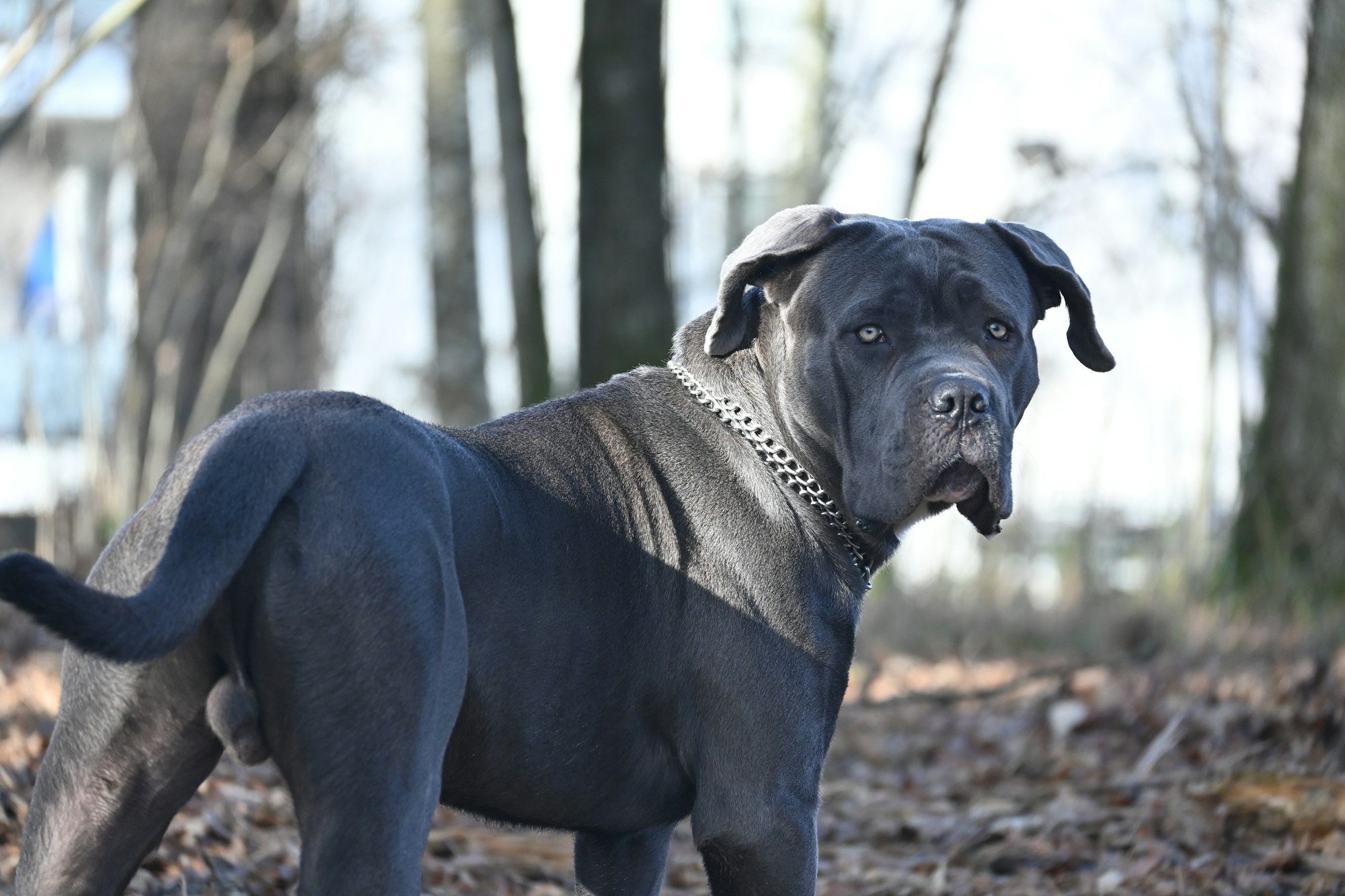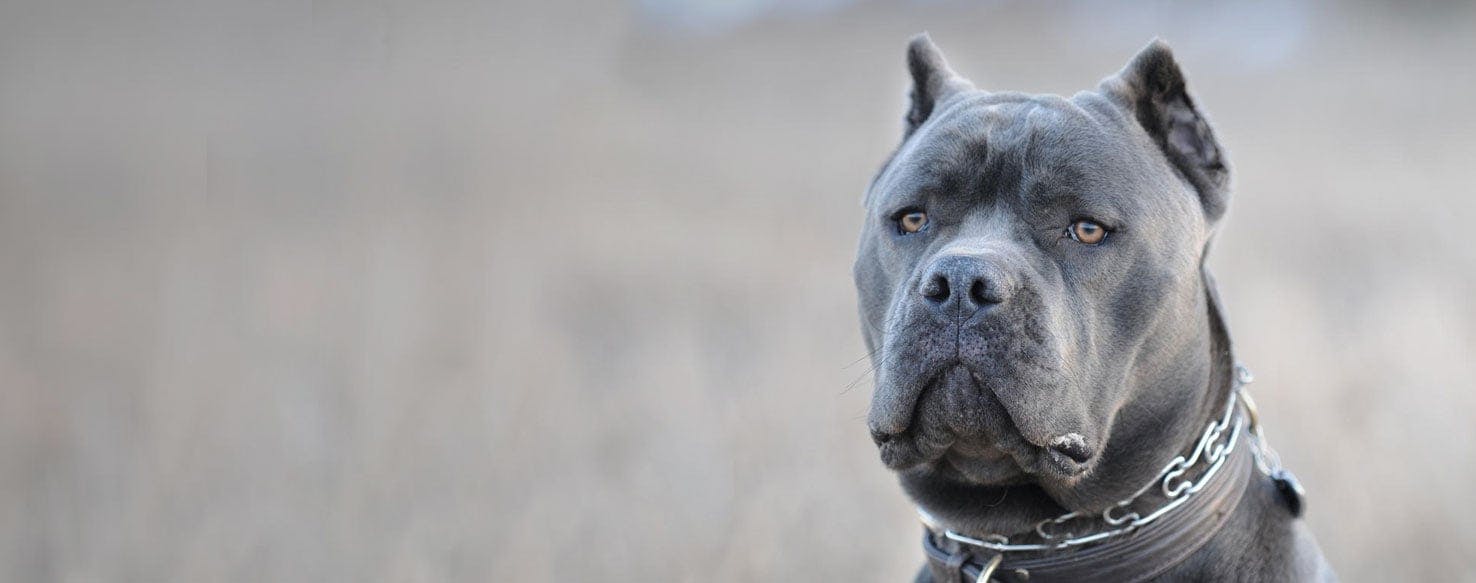Are you wondering if you can get a blue cane corso? Well, you might be surprised to learn that the blue coat color in cane corsos is not officially recognized by the breed standard. While you may come across cane corsos with a blue coat, it is considered a non-standard color variation and may not be readily available from reputable breeders.
The cane corso is a powerful and majestic breed known for its protective nature and loyal temperament. Originally hailing from Italy, these dogs were historically used for hunting, guarding, and protecting livestock. While the breed standard states that cane corsos should have a black, gray, or fawn coat, the demand for blue cane corsos has increased in recent years. However, it’s important to note that the blue coat color can be associated with certain health issues, so prospective owners should be cautious in their search for a blue cane corso and ensure they acquire one from a reputable breeder who prioritizes the health and well-being of the dogs.
Yes, you can get a blue Cane Corso. The blue color in Cane Corsos is a recessive gene variation, but it is possible to find breeders who specialize in producing blue Cane Corsos. When looking for a blue Cane Corso, make sure to research reputable breeders who prioritize the health and temperament of their dogs. Remember, owning any dog, including a blue Cane Corso, requires commitment and responsible ownership.

Can You Get a Blue Cane Corso?
Blue Cane Corsos are a popular choice among dog enthusiasts, but can you actually get a blue Cane Corso? In this article, we will explore the world of blue Cane Corsos and provide you with all the information you need to know about this unique breed.
What is a Blue Cane Corso?
A blue Cane Corso is a specific color variation of the Cane Corso breed, characterized by its blue coat. The coat color can range from a light gray-blue to a darker steel blue shade. The blue color is caused by a dilution gene, which affects the pigmentation of the coat.
While the blue Cane Corso is not recognized as a standard color by all kennel clubs, it is still a sought-after variation among enthusiasts. However, it is important to note that the blue coloration does not affect the temperament or health of the dog.
How to Get a Blue Cane Corso
If you’re interested in getting a blue Cane Corso, there are a few options available to you:
- Reputable Breeders: Look for reputable breeders who specialize in breeding blue Cane Corsos. They will have a thorough understanding of the genetics involved in producing blue-coated puppies and will prioritize the health and well-being of their dogs.
- Rescue Organizations: Check with rescue organizations that focus on Cane Corsos or other large breeds. Sometimes, these organizations may have blue Cane Corsos available for adoption.
It is important to do thorough research when looking for a blue Cane Corso. Check the breeder or rescue organization’s reputation, and ask about the health testing that has been done on the parents of the puppies.
Caring for a Blue Cane Corso
Once you have a blue Cane Corso, it’s important to provide them with proper care and attention. Here are some key considerations:
Exercise and Mental Stimulation
Blue Cane Corsos are an active and intelligent breed, so regular exercise and mental stimulation are essential for their overall well-being. Make sure to provide them with daily walks, playtime, and interactive toys to keep them physically and mentally stimulated.
Training and Socialization
Proper training and socialization are crucial for a blue Cane Corso. Start training and socializing them from a young age to ensure they grow into well-behaved and confident dogs. Consider enrolling them in obedience classes or working with a professional trainer.
Grooming
Grooming requirements for a blue Cane Corso are relatively low. They have short, dense coats that only require occasional brushing to remove dead hair. Regular nail trims, dental care, and ear cleaning should also be part of their grooming routine.
| Header 1 | Header 2 |
| Row 1, Column 1 | Row 1, Column 2 |
| Row 2, Column 1 | Row 2, Column 2 |
Overall, caring for a blue Cane Corso is similar to caring for any other Cane Corso. Regular exercise, proper training, and socialization are key to raising a happy and well-adjusted dog.
Are Blue Cane Corsos Suitable for Everyone?
While blue Cane Corsos are stunning dogs, they may not be suitable for everyone. Here are a few things to consider:
Size and Strength
Blue Cane Corsos are large and powerful dogs. They require an owner who is physically capable of handling their size and strength. They are not recommended for inexperienced or frail owners.
Training and Socialization
Cane Corsos, including blue Cane Corsos, require consistent training and extensive socialization to ensure they become well-behaved companions. They are not a good fit for owners who cannot commit to providing the necessary training and socialization.
Activity Level
Blue Cane Corsos have a moderate to high activity level and require regular exercise. They are not suitable for individuals or families who cannot provide them with the exercise and mental stimulation they need.
Lifestyle and Commitment
Owning a blue Cane Corso, or any dog for that matter, is a lifelong commitment. Consider your lifestyle, living situation, and ability to provide the care and attention a blue Cane Corso requires before making the decision to bring one into your home.
Key Takeaways
- Yes, you can get a blue Cane Corso.
- Blue Cane Corsos have a unique and striking coat color.
- The blue color in Cane Corsos is a result of a dilution gene.
- Blue Cane Corsos may have blue or gray eyes.
- It’s important to find a reputable breeder when getting a blue Cane Corso.
Frequently Asked Questions
In this section, we will answer some commonly asked questions about owning a blue cane corso.
1. Can you choose the color of a Cane Corso?
Yes, you can choose the color of a Cane Corso. While the traditional color is black or fawn, there are certain color variations within the breed. One of these variations is the blue Cane Corso, which has a gray or blue coat. It is important to note that blue is a recessive color in Cane Corsos, so breeding for this specific color may be more challenging and less common.
When looking for a blue Cane Corso, it is crucial to find a reputable breeder who prioritizes health and temperament over color. A responsible breeder will conduct health tests on their breeding dogs to ensure they are not passing on any genetic issues. Remember, color should never be the sole factor in choosing a Cane Corso; it is essential to consider the overall health and temperament of the dog.
2. Are blue Cane Corsos more prone to health issues?
No, blue Cane Corsos are not inherently more prone to health issues compared to other colors within the breed. Health issues in Cane Corsos, regardless of color, can arise due to genetic factors, improper breeding practices, or inadequate care. It is essential to choose a responsible breeder who conducts health tests on their dogs and prioritizes the overall health and well-being of the breed.
A reputable breeder will be transparent about any health issues that may be present in their breeding lines, regardless of color. Additionally, providing proper care, including a nutritious diet, regular exercise, and routine veterinary check-ups, can help maintain the overall health of a blue Cane Corso.
3. Are blue Cane Corsos more aggressive or have behavioral problems?
No, the color of a Cane Corso, including blue, does not determine their temperament or behavior. Like any other color variation within the breed, a blue Cane Corso can have a range of temperaments, from gentle and calm to protective and alert.
A dog’s temperament and behavior are influenced by various factors, including genetics, socialization, and training. It is crucial to provide proper socialization and obedience training to any Cane Corso, regardless of their color. Consistent and positive training methods, along with early socialization, can help shape a blue Cane Corso into a well-behaved and balanced dog.
4. How much exercise does a blue Cane Corso need?
Blue Cane Corsos, like all Cane Corsos, are a large and energetic breed that requires regular exercise. They benefit from daily walks, play sessions, and mental stimulation activities. Ideally, they should engage in at least 60-90 minutes of exercise per day to prevent boredom and promote their physical and mental well-being.
It is important to note that exercise needs may vary depending on the individual dog’s age, health, and activity level. It is always recommended to consult with a veterinarian or a professional dog trainer to determine the appropriate exercise regimen for your blue Cane Corso.
5. Can I adopt a blue Cane Corso from a shelter or rescue?
While it is possible to find a blue Cane Corso in a shelter or rescue, it may be less common compared to finding one from a reputable breeder. Blue Cane Corsos are fewer in number due to the recessive nature of the blue coloration. However, this does not mean that they cannot be found in shelters or rescues.
If you are interested in adopting a blue Cane Corso, it is recommended to check with local shelters, rescue organizations, and Cane Corso-specific rescues. They may have blue Cane Corsos available for adoption or may be able to direct you to other resources where you can find one. Adoption can be a rewarding experience, giving a deserving dog a loving home.

In summary, it is possible to get a blue cane corso. Blue cane corsos are a color variation of the cane corso breed. The blue color is caused by a dilution gene and can range from a light silver-gray to a darker blue-gray. While they are less common than other cane corso color variations, blue cane corsos do exist and can be found through reputable breeders.
When looking for a blue cane corso, it is important to find a responsible breeder who prioritizes the health and well-being of the dogs. Reputable breeders will conduct health tests on their breeding dogs to ensure they are free from any genetic disorders. Additionally, they will provide proper socialization and training for their puppies, setting them up for a happy and well-adjusted life.
